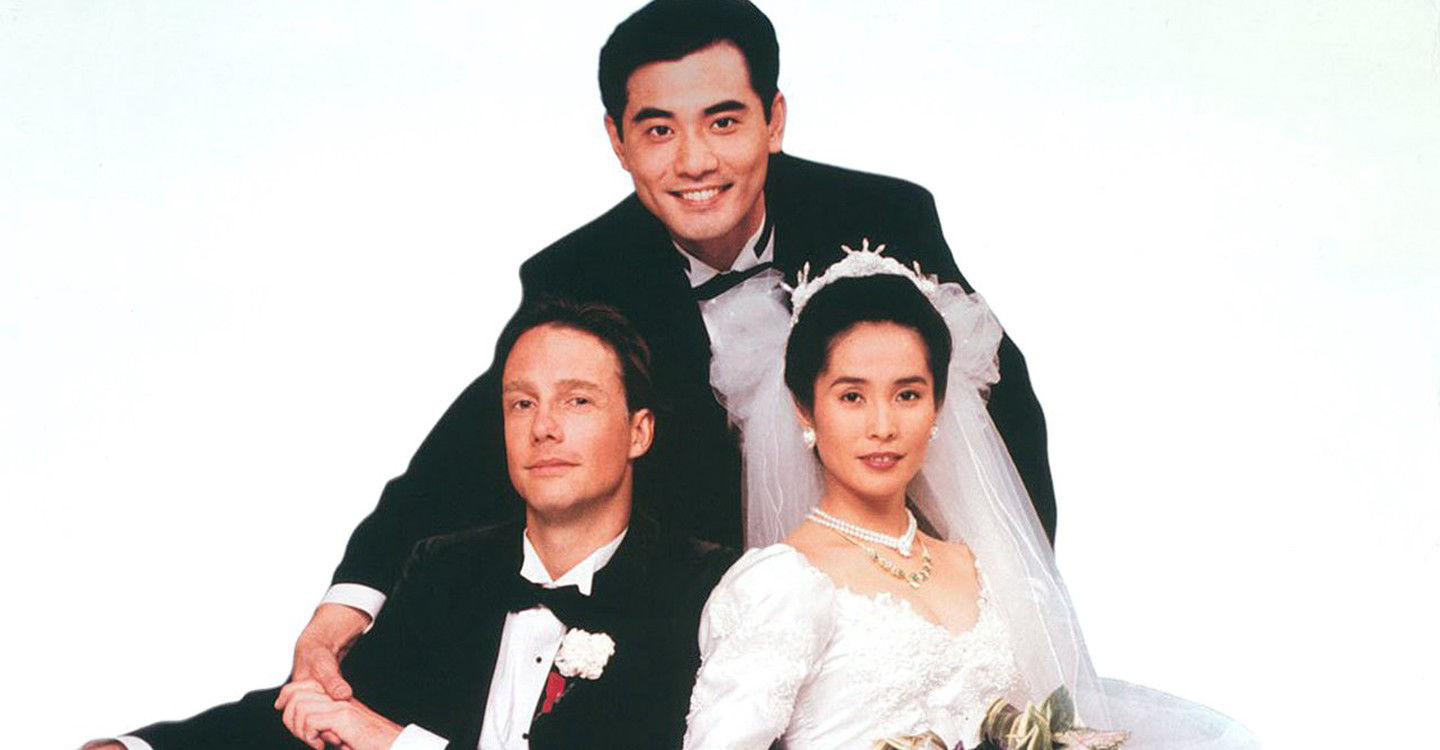Back to Asian Americans on Celluloid Timeline
The Wedding Banquet (1993)
Directors: Ang Lee
Length: 106 minutes
View this film for free on the platforms below (available for rental on others):
- https://pluto.tv/on-demand/movies/the-wedding-banquet-1993-1-1
- https://mediaverse.plex.tv/movie/the-wedding-banquet
- https://tubitv.com/movies/303018/the-wedding-banquet

Still from The Wedding Banquet
Synopsis
The Wedding Banquet is a romantic comedy about a marriage of convenience gone wrong. Wai-Tung Gao is a gay Taiwanese American man in a happy relationship with his partner Simon. Under Simon’s suggestion, Wai-Tung decides to marry their struggling artist friend Wei-Wei to help her get a green card while also to please his parents in Taiwan who are eager to see him get married. The plan goes awry when Wai-Tung’s parents fly to New York City, forcing Wei-Wei and Wai-Tung to go through a grand wedding banquet and to follow numerous traditional wedding customs. The fake and drunk couple ended up having sex on the wedding banquet night, and Wei-Wei became pregannt. The extended stay of Wai-Tung’s parents also exacerbates the tension in Simon and Wai-Tung’s relationship. When Mr. Gao has a stroke, Wai-Tung finally confesses to his mother about his sexuality and feigned marriage. They decide to keep this from the father due to health concerns. However, Mr. Gao has already picked up on Simon and Wai-Tung’s relationship but never mentions anything. Mr. Gao ultimately accepts Simon as his son-in-law, and tells him that he knows the secret. They agree to keep their conversation a secret, allowing the rest of the family to keep “lying” to him. Wei-Wei eventually decides to keep the baby and asks Simon to be one of the fathers.
Significance
The Wedding Banquet is a cultural feast of intersectionality. Much of what this progressive film showed in the early 1990s is still relevant and uncommon in cinema today. It interweaves narratives from the gay and interracial relationship and Asian American male sexuality to immigration, Chinese diaspora, a variety of Chinese wedding customs, and Taiwanese vs. mainland Chinese contextual differences. We get to hear Mandarin Chinese, Shanghai dialect, and English. The film dives deeply into cross-cultural conflicts between modern and traditional values, and presents Asian characters and acceptance in culturally nuanced ways. The film itself is another example of the success of transnational Asian and Asian American cinema and played a key role in the development of independent American cinema.
The filmmaker
Ang Lee (1954-) was born and grew up in the Pingtung County of Taiwan. Lee attended the National Taiwan College of Arts, the University of Illinois at Urbana-Champaign, and New York University to study theatre and film production. After graduating from NYU, Lee struggled to get funding and mainly stayed at home to take care of his family. Lee found his first major success both in Taiwan and internationally through three films that he directed and co-wrote to explore inter-generational and cross-cultural conflicts: Pushing Hands (1991), The Wedding Banquet (1993), and Eat Drink Man Woman (1994). Lee continues to explore different genres. His oeuvre includes the period drama film Sense and Sensibility (1995), the revisionist Western Ride with the Devil (1999), the superhero blockbuster Hulk (2013), and another romantic drama about a gay relationship Brokeback Mountain (2005). He also continues to focus on Chinese contexts in films such as Crouching Tiger, Hidden Dragon (2000) and Lust, Caution (2007). A multiple Academy Awards winner, Lee is the first non-white director to win Best Director twice. Lee self-disclosed that he is a U.S. permanent resident and it is unclear if he has ever naturalized as a citizen.
Back to Asian Americans on Celluloid Timeline
Further reading and listening
Academic Articles and Chapters
- Han, Qijun. “Diasporic Chinese family drama through a transnational lens: The Wedding Banquet (1993) and Saving Face (2004).” International Journal of Media & Cultural Politics3 (2019): 323-343.
- Marchetti, Gina. “The Wedding Banguet: Global Chinese Cinema and the Asian American Experience.” Countervisions: Asian American Film Criticism. Ed. Darrell Y. Hamamoto and Sandra Liu. Philadelphia: Temple University Press, 2000.
- Martin, Fran. Situating Sexualities: Queer Representation in Taiwanese Fiction, Film and Public Culture. Hong Kong: Hong Kong Univ. Press, 2003. (Chapter 5 “Globally Chinese at The Wedding Banquet.”)
Newspaper Articles and Blogs
- Pacheco, Patrick. “Cultural Provocateur: In ‘The Wedding Banquet,’ Ang Lee Stirs Up Custom.” Los Angeles Times, 4 Aug. 1993.
- Holden, Stephen. “Review/Film; A Union of Convenience Across a Cultural Divide.” The New York Times, 4 Aug. 1993.
- “Intersectionality of The Wedding Banquet.” SP Film Journal, 21 June 2013.
- Klemm, Michael D. “Going To The Chapel.” Cinemaqueer.com, October 2009.
Podcasts
- Saturday School Podcast. “The Wedding Banquet.”
- The RomCom Effect Podcast. “The Wedding Banquet with James Sweeney.”
